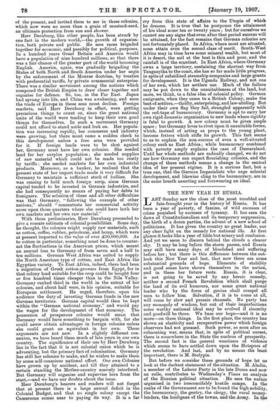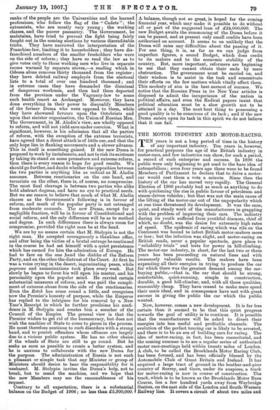THE NEW YEAR IN RUSSIA.
,T AST Sunday saw the close of the most troubled and _LJ fate-fraught year in the history most Russia. It has been a year of poverty, of famine, of wild excesses of crime punished by excesses of tyranny. It has seen the dawn of Constitutionalism and its temporary suppression, the birth of a dozen parties, the advent of a new school of politicians. It has given the country no great leader, nor any clear light on the remedy for national ills. At first glance it looks like a year of little but misery and confusion. And yet we seem to discern behind the clouds a clearer sky. It may be long before the storm passes, and Russia may still have many days of bloodshed and suffering, before her ; but there is this difference between the out-. look this New Year and last, that now there are soma substantial grounds of hope. Elements of stability and good sense have shown themselves in the nation, and in these her future rests. Russia, it is clear, is not going to be saved by any heroic remedy, neither a second French Revolution which shall purge the land of its evil humours, nor some great national leader who by the force of genius shall compel all men to follow him. Salvation, if it is to come at all, will come by slow and prosaic channels. No party has any monopoly of wisdom, but out of their imperfections some worthy national ideal may be evolved if sincerity and goodwill be there. We base our hope—and it is no more—on three things. In the first place, the country has shown an elasticity and recuperative power which foreign observers had not guessed. Such power, so soon after an exhausting war, means that, in spite of political unrest; there is somewhere in the State the nucleus of prosperity. The second fact is the general weariness of violence which seems to have settled down upon the Hotspurs of the revolution. And last, and by no means the least important, there is M. Stolypin. But before we consider these grounds of hope let us look at the darkest statement of the situation. M. Aladin, a member of the Labour Party in the late Duma, and now an exile, contributes to Wednesday's Times an analysis of the Russian political situation. He sees the Wien organised in two irreconcilably hostile camps. In the ranks of the Government are to be found the high nobility, the bureaucracy, the gentry, the clergy, the rural money- lenders, the hooligans of the towns, and the Army. In the ranks of the people are the Universities and the learned professions, who follow the flag of the • " Cadets r ; the extremists, who are mostly very young ; the working classes, and the poorer peasantry. The Government, he maintains, have tried to prevent the fight being fairly fought but in the coining elections by various discreditable tricks. They have narrowed the interpretation of the Franchise-law, limiting it to householders ; they have dis- franchised numbers of the smaller freeholders who were on the side of reform ; they have so read the law as to give votes only to those working men who live in separate rooms warmed by separate stoves,—a reading which in Odessa alone removes thirty thousand from the register ; they have deleted railway employs from the electoral lists to a total of over one hundred thousand ; and in extreme cases they have demanded the dismissal of dangerous workmen, and then had them deported from the province under the Vagrancy-law to some such health resort as. Archangel. Moreover, they have done everything in their power to disqualify Members of the former Duma who were opposed to them, while they have showered favours upon the Octobrists and upon that sinister organisation, the Union of Russian Men. The Government, in M. Aladin's view, are wholly opposed to reform, and will not yield save under coercion. What is significant, however, is his admission that all the parties of reform, with the exception of the extreme terrorists, have agreed that a direct attack is of little use, and that the pnly hope lies in flanking movements and a slower advance. This in itself is something gained. If the new Duma is prepared to work by instalments, and not to risk its existence by taking its stand on some premature and extreme reform, then there is every reason to hope for good results. We should go further, and doubt whether the opposition between the two parties is anything like as radical as M. Aladin assumes. Between reactionaries on the one hand, and terrorists on the other, there is, of coarse, no compromise. The most final cleavage is between two parties who alike hold abstract dogmas, and have no eye to practical needs. But we see reason to believe that much of what M. Aladin classes as the Government's following is in favour of reform, and much of the popular party is not estranged from moderate counsels. The new Duma, except for a negligible fraction, will be in favour of Constitutional and social reform, and the only difference will be as to method and degree. In such differences there is always room for compromise, provided the right man be at the head.
We are by no means certain that M. Stolypin is not the right man. He accepted courageously a thankless office, and after being the victim of a brutal outrage he continued in the course he had set himself with a quiet persistence which has earned for him the admiration of Europe. He had to face on the one hand the dislike of the Reform Party, and on the other the distrust of the Court. At first he was a voice crying in the desert, ingeminating peace, while pogroms and assassinations took place every week. But slowly he began to force his will upon his master, and his personality upon the popular mind. He carried certain substantial measures of reform, and was paid the compli- ment of extreme abuse from the side of the reactionaries. Even the Retch has come round a little, and recognises now the Premier's honesty of purpose, while the Emperor has replied to the intrigues for his removal by a New Year's Rescript in which he further proclaims his confi- dence in M. Stolypin and creates him a member of the Council of the Empire. The general view is that the Premier wishes to get rid of the bureaucracy, but does not wish the machine of State to come to pieces in the process. He must therefore continue to curb disorders with a strong hand, and to punish offenders whose offences are largely due to a vicious public system. He has no other choice if the wheels of State are still to go round. But he seeks as soon as possible to create a better system, and he is anxious to collaborate with the new Duma for the purpose. The administration of Russia is not such a pleasant or simple task that any Minister or group of Ministers should desire to bear the responsibility for it unshared. M. Stolypin invites the Duma's help, not to break, but to mend the machine, and we hope that the new Members may see the reasonableness of his request. Contrary to all expectation, there is a substantial balance on the Budget of 1906; no loss than £5,300,000.
A.balance, though not so great, is hoped for the coming financial year, which may make it possible to do without all or part of the suggested loan of £24,000,000. The new Budget awaits the summoning of the Duma before it can be passed, and at present only small credits have been authorised on account. It seems to us unlikely that the Duma will raise any difficulties about the passing of it. For one thing, it is, as far as we can judge from imperfect figures, a sound Budget, which does credit to its makers and to the economic stability of the country. But, more important, reformers are beginning to see that they cannot obtain their ends by mere obstruction. The government must be carried on, and their wisdom is to assist in the task and concentrate their efforts on the few matters which vitally affect them. This modesty of aim is the best earnest of success. We notice that the Russian Press in its New Year articles is disposed to admit the inexperience of the nation in political affairs, and even the Radical papers insist that political education must be a slow growth not to be attained in a day. The next best thing to possessing a good quality is to be conscious of its lack ; and if the new Duma enters upon its task in this spirit we do not believe that it can fail.







































 Previous page
Previous page